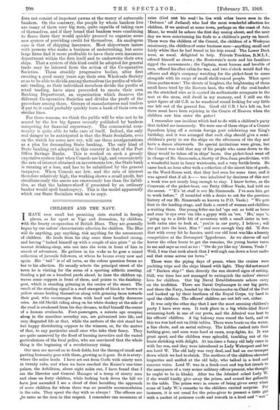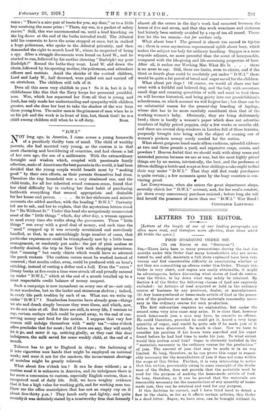CHILDREN AND THE NAVY.
-I- HAVE seen small but promising riots started in foreign 1 places, as far apart as Vigo and Jerusalem, by children, with the hearty co-operation of British Blues. They are generally begun by our sailors' characteristic affection for children. The Blue will do anything, pay anything, risk anything for the amusement of children. He lands from his ship some three hundred strong, and having " lushed himself up with a couple of nice pints" at the nearest drinking-shop, sets out into the town in front of him in search of adventure. He gathers in his wake as he goes a mixed collection of juvenile followers, at whom he beams every now and again. His " tail " is of all races, as the colour question forms no bar to his affection. He usually selects the principal street of the town he is visiting for the scene of a sporting athletic meeting. Sending a pal on a hundred yards ahead, he lines the children up, waves some coppers in front of them, and points to the finishing- post, which is standing grinning in the centre of the street The result of the starting signal is a mad stampede of black or brown or yellow atoms hurling themselves along with grinning faces towards their goal, who encourages them with loud and hardly decorous cries. An old Sheikh riding along on his white donkey at the side of the road is awakened from his day-dreams, to find himself the centre of a human avalanche. Foot-passengers, a minute ago creeping along in the merciless noonday gun, are galvanized into life, and very disgusted life at that, while the authors of the riot stand hot but happy distributing coppers to the winners, or, for the matter of that, to any particular small ones who take their fancy. They are quite unmoved by the flood of burning invective and the varied gesticulations of the local police, who are convinced that the whole thing is the beginning of a revolutionary rising.
Our men are moved on to fresh fields, but the throng of small and panting humanity goes with them, growing as it goes. So it is every- where the sailor lands. I have set out from Corfu with ninety men in twenty cabs, and when we have reached the Kaiser's one-time palace, the Achilleion, about eight miles out, I have found that I am the Director and General Manager of a troop of ninety men and close on forty children, while looking back dawn the hill we have just ascended I see a cloud of dust heralding the approach of more children for whom there was no possible accommodation in the cabs. They spent the day with us always ! The officers are the same as the men in this respect. I remember one messmate of
mine (God rest his soul I he lies with other brava men in the ' Defence ' off Jutland) who had the most wonderful affection for children. If we arrived at some town, perhaps on the coast of Asia Minor, he would be ashore the first day nosing about, and the next day we were entertaining his finds to a- children's party on board. There were the children of the Consul, the children of a Wesleyan missionary, the children of some business men—anything small and fairly white that he had found in his trip round. The Lower Deck were, as usual, delighted to help. Private Tomkins, R.M.L.I., offered himself as clown ; the Boatswain's mate and his familiars rigged the amusements ; the Captain, most human and lovable of men, offered his after cabin for tea; and two o'clock would find the officers and ship's company watching for the picket-boat to come alongside with its cargo of small shrill-voiced people. What sport those parties were! The shouts of laughter, the brightening of those small faces tried by the Eastern heat, the whir of the coal-basket on the stretched wire as it carried its enthusiastic occupants to the mat at the stern, still dwell in my memory, and I still see the quiet figure of old C.B. as he wandered round looking for any little one left out of the general fun. Good old C.B. I he's left us, but there must have been rejoicing in the Courts of Heaven when the children saw him enter the gates!
I remember one incident which had to do with a children's party that tickled me immensely. We were one of three ships of a Cruiser Squadron lying off a certain foreign port celebrating our King's birthday, and it was arranged that each ship should give a semi- children's party to see the ships on the afternoon of the day and have a dance afterwards. No special invitations were given, but the Consul was told that any of his people who came down to the Quay would be taken off in ships' boats. Our picket-boat went off in charge of Mr. Simmonds, a Snotty of Don Juan proclivities, with a wonderful taste in fancy waistcoats, and a very fertilebrain, He came back an hour after with a collection of the nicest bits of goods, as the Ward-Room said, that they had seen for some time, and it was agreed that if all A— was inhabited by denizens of this sort a week was not nearly long enough to stay. I knew better, as the Coxswain of the pieket-boat, one Petty Officer Veale, had told me the secret. "'B's 'ot stuff is our Mr. Simmonds. I've seen him get to work before." (I trembled with a desire to ask for the previous history of our Mr. Sim.monds as known to P.O. Veale.) "We gets first to the landing-stage, and finds a crowd of women and children a-waiting there. Our young feller-me-lad 'ops out as bold as brass and runs 'is eye over 'em like a gypsy with an 'oss. 'Ho,' says 'e,
going up to a little bit of seventeen with a small sister in tow, both extra nice to look at, you're in our party, I believe ; will yer get into the boat, Miss ? ' and sure enough they did. 'E does that with every bit he fancies, until our old boat was like a beauty competition at the Devonport 'Ippodrome. As we shoves off said leaves the other boats to get the remains, the young buster turin to me and says as cool as ice : "Ow do yer like my 'Amore, Veale? Well, I was that took aback that I well-nigh ran down a boat undei sail that come across me bows."
Those were the piping days of peace, when the cruises were yachting trips and the ships blazed with light. They did not sound off "Darken ship!" then directly the sun showed signs of setting. Still, war time has not managed to extinguish the sailors' eternal love for children. Our big Naval Establishments ashore carry on the tradition. There are Naval Orphanages in our big ports, and there the Navy, headed by the Commander-in-Chief of the Port and backed up by their brethren of the Royal Corps, try hard to spoil the children. The officers' children are not left oat, either.
It was only the other day that I saw the most amusing children's party I have ever seen. It took place in a big white-tiled Naval swimming-bath in one of our ports, and the Admiral was host to his officers' children. A big balcony runs round the bath, and on this tea was laid out on little tables. There were boats on the water, a fine chute, and an aerial railway. The kiddies rushed into their bathing-gear, and soon were hard at races, mop-fights, &a. It was great sport, and the children were splendid, tombling out of the boats shrieking with delight At tea-time a funny old lady came in with her son, and they were introduced as Lady Waterport and her son Lord W. The old lady was very deaf, and had an ear-trumpet down which we had to shriek. The mothers of the children elevated lorgnettes and sniffed at the old lady, who talked in a loud and raucous voice. Lord W. was in a frock-coat and top-hat (much to the annoyance of a very senior military officerpresent who thought he ought to be in khaki). After tea the Admiral asked Lady W. if she would kindly give away the prizes, and armed her gallantly to the table. The prizes were in course of being given away when some of Lady W.'s remarks to the children excited surprise. For instance, it is net usual for the prize-giver to present a little girl with a packet of patience cards and remark in a loud and "wet ' voice : "There's a nice pair of boots for you, my dear," or to a little boy receiving the same prize : "There, my son, is a packet of safety razors." Still, this was uncommented on, until a loud knocking on the big doors at the end of the baths intruded itself. The Admiral told his coxswain to have the noise stopped at once, but in stalked a huge policeman, who spoke to the Admiral privately, and then demanded the right to search Lord W., whom he suspected of being a spy. After a struggle documents were found on Lord W., and he started to run, followed by his mother shouting " Rudolph ! my poor Rudolph !" Round the baths they went. Lord W. slid down the chute, followed by his sporting mother, the policeman, and attendant officers and matelots. Amid the shrieks of the e vsited children, Lord and Lady W., half drowned, were pulled out and carried off on stretchers. The children still talk of it
Does all this seem very childish to you ? So it is, but it is by childishness like this that the Navy keeps her perennial youthful- ness. War, which has separated her from all that is young and fresh, has only made her understanding and sympathy-with children greater, and she does her best to take the shadow of the war from those young lives. The sailor mania the grimmest of men when he is on his job and the work is in front of him, but, thank God! he is a
child among children dill when he is off duty. Blau.



























 Previous page
Previous page